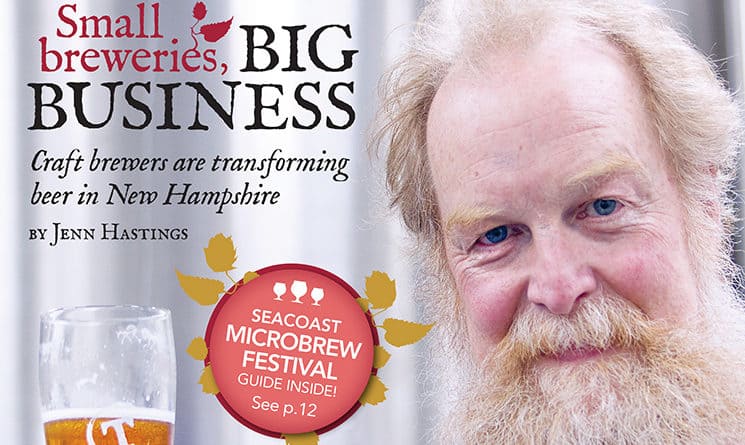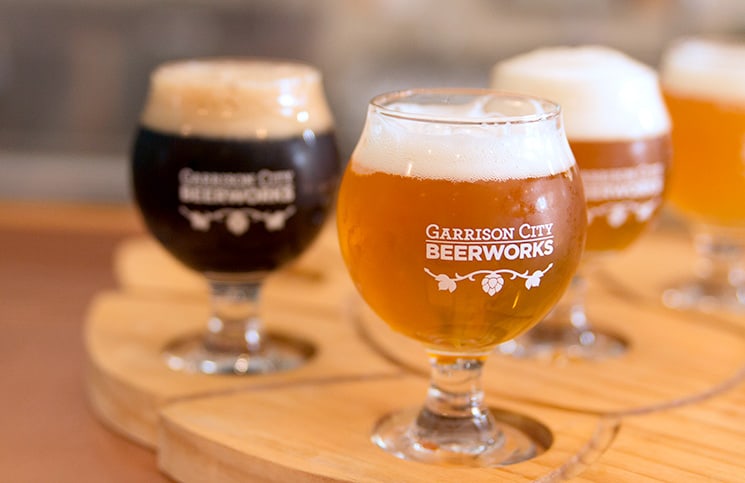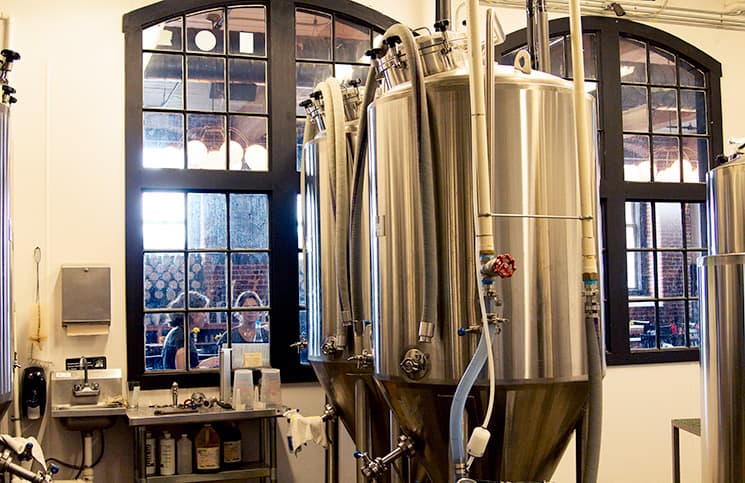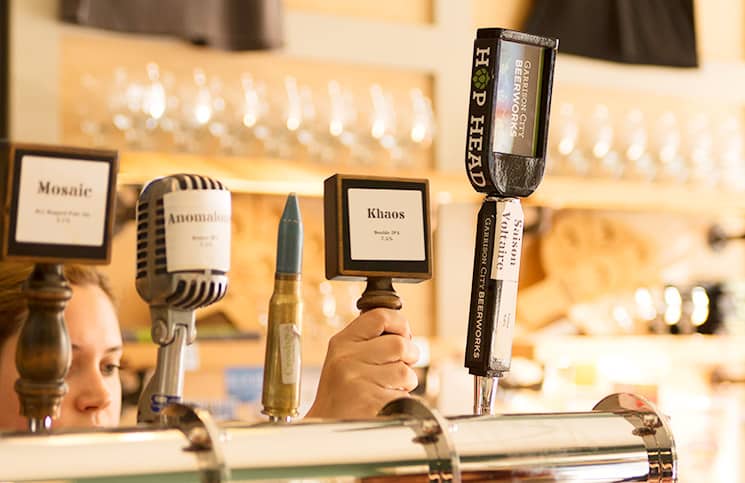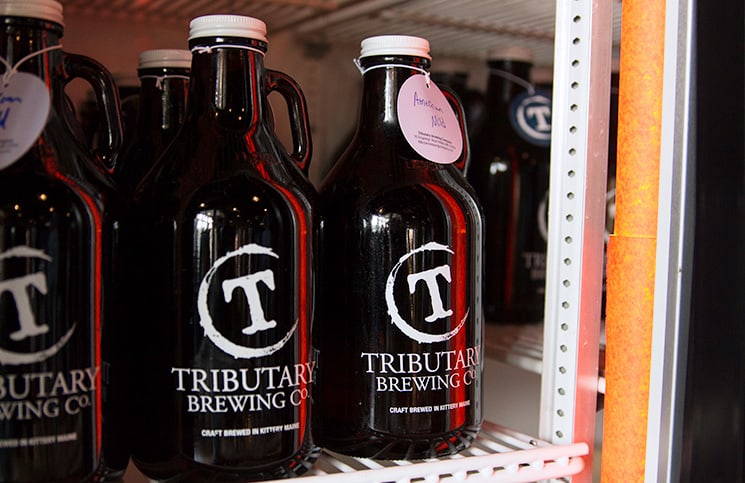In the right hands, turning water, hops, and barley into beer is nothing short of alchemy. But as any craft brewer will you, that magic is not meant to be appreciated alone. Beer is a social thing — it is best when made and enjoyed with friends.
Luckily, brewing beer is a community event in the Seacoast. Changes in state law, a renewed emphasis on local food, and Granite Staters’ seemingly unquenchable thirst for beer (we ranked second in the nation for beer consumption in 2012, according to industry group the Beer Institute) have ushered in a new golden age for small breweries in the region. In the last five years, breweries like Stoneface Brewing Co. in Newington and Garrison City Beerworks in Dover have opened and thrived, helping to establish the Seacoast as a craft beer destination. And it’s not over yet: more breweries, including Newmarket’s Deciduous, are opening soon.
Now, those breweries are having a party. The first-ever Seacoast Microbrew Festival comes to Dover on Saturday, July 11, and it’s a celebration of how craft beer has shaped the region socially and economically.
“We’re all banding together and getting the state to recognize that craft beer is something that can help strengthen New Hampshire as its own brand,” said Scott Thornton of Portsmouth’s Great Rhythm Brewing Company.
Riding the wave
“I’ve been on this wave for literally 25 years, and we still haven’t hit the crest,” said Tod Mott, the owner of Tributary Brewing in Kittery, Maine, and the brewer behind Portsmouth Brewery’s legendary Kate the Great Russian imperial stout and the original Harpoon IPA.
The modern era of local craft brewing began in the mid-1990s, when Portsmouth Brewery and Smuttynose Brewing Co. opened their doors. In fact, Portsmouth Brewery was the first brewpub in the state, noted Dave Boynton, co-owner of 7th Settlement Brewery in Dover.
“Most of the breweries on the Seacoast would have (had) a much tougher time without them paving the way for us,” Boynton said.
Since then, craft beer has flourished in the Granite State. According to the nonprofit Brewers Association, in 2014, New Hampshire’s 26 craft breweries made close to 80,000 barrels of beer and had a $248 million economic impact on the state.
Today’s new breweries also owe a debt to craft beer advocates like Nicole Carrier and Annette Lee of Hampton’s Throwback Brewery, one of the country’s only female-owned breweries. They worked with legislators in Concord to update regulations, many of which had been on the books since the end of Prohibition. Lee worked to get local beer allowed at farmers markets, and testified in Concord on behalf of the 2011 law that created the first distinct licenses for nano-breweries in the nation. Since the law took effect, six nano-breweries have opened on the Seacoast, with at least two more opening soon.
Nano-breweries are one of three types of licenses brewers can get in New Hampshire. The nano-brewery license is the least expensive — they produce less than 2,000 barrels annually and they’re not required to serve food to go with their beer. However, they can’t serve full pints, either. Instead, they pour four-ounce sample sizes.
“The nano-breweries can pour nano-beers, if you will,” said Carrier.
For bigger pours, breweries must have a brewpub license, which means they also have to serve hot food. For some breweries, it’s an extra challenge. For others, it’s part of their vision.
“We really wanted to focus on the community, and a pub is a public house,” said Boynton, who grew up on a farm and is passionate about local food as well as local beer.
The third type of license available in New Hampshire is the beverage manufacturer license. According to Stoneface co-owner Erol Moe, the company started out as a beverage manufacturer because they knew they would be producing far too much beer to qualify as a nano-brewery.
The business of beer
Many people who have received a home-brew kit for Christmas fantasize about opening their own brewery, but actually running one takes a fair amount of money — not to mention talent and nerve. The state nano-brewery license costs only $240, but other start-up costs can be steep. Most local breweries are partnerships between friends or relatives with complementary skill sets, and it is not unusual for at least one partner to continue to work a day job while they build the business.
The partners in Earth Eagle Brewings in Portsmouth started out with a brewing supply store first; their taproom has seen three incremental expansions so far. They could expand more quickly, but that would require loans.
“We’ve pretty much built this business out of pocket,” said Alex McDonald, one of Earth Eagle’s founders.
But craft brewers are a cooperative crowd. “The community around craft beer is incredibly supportive of each other,” said McDonald. Competitors (or compatriots, as Moe prefers to call them) are happy to share best practices, vendor suggestions, and even equipment.
For example, Tributary loaned Earth Eagle a carbonation meter they could not afford to buy. When they were opening the brewery, 7th Settlement received help from Throwback; now they’re repaying the favor by helping Throwback with their new brewpub. Stoneface supplied North Country Cider with hard-to-find Mosaic hops for Hopshire, their dry-hopped cider. When Rik Marley at New London’s Flying Goose Brew Pub wanted to brew a Russian imperial stout, he naturally called Mott, who he dubbed “the Godfather of Russian imperial stout,” for advice.
For Mott, sharing his wisdom is not completely altruistic: it’s also good for business. “Making sure people are doing it right is just going to make the brewing community better,” he said. Brewing top-quality beer requires considerable skill, and when inexperienced brewers put out inferior product, the whole industry suffers.
According to Mott, craft beer still represents only 11 percent of the market by volume, because Budwesier, Coors, and Miller still dominate. He said that craft brewers have far more to gain by taking market share from the “fizzy, yellow beers” than by going after one another.
The secret’s out
If there’s one thing New Hampshire microbreweries don’t make, it’s fizzy, yellow beer. The beers they do make run the gamut. The larger breweries tend to have a flagship beer that is always available, such as Great Rhythm’s Resonation Pale Ale or Tributary’s Pale Ale. Some have a signature focus: Beara Irish Brewing Co. in Portsmouth uses imported Irish barley. Other breweries, especially the smallest ones, experiment

